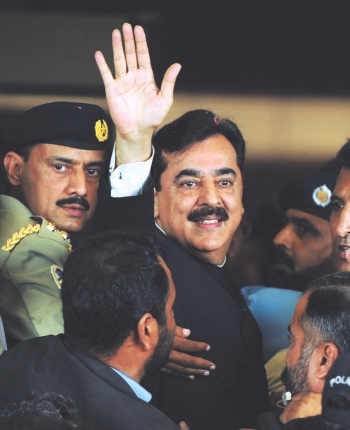| Home - Back Issues - The Team - Contact Us |
 |
| Volume 11 |Issue 26| June 29, 2012 | |
|
|
Current Affairs A Tale of Two Nations Shakhawat Liton The principle of British Constitutional law--the King can do no wrong-- has been a thousand-years-old provision in the UK. Many other countries follow this principle, incorporating it in their respective constitutions, giving the heads of the state and governors total immunity. The immunity means no case can be filed against the head of state when s/he is in office. Even if s/he commits murder, dacoity, theft, or some other crime, the King cannot be dragged to court and made to face a trial. Does it mean that the head of the state can make any criminal offences? And if s/he does any transgress, what will happen? The Parliament has the authority to impeach the head of the state. The same provision is in the constitution of Pakistan. Article 248(2) says, “No criminal proceedings whatsoever shall be instituted or continued against the President or Governor in any Court during his term of office.” But the Pakistan Supreme Court has refused to honour the provision and has gone overboard, staging a judicial coup. It was indeed ridiculous the way the Supreme Court removed the Pakistan Prime Minister Yousuf Raza Gilani by convicting him in a contempt case. The apex court ordered Gilani to write to the Swiss government to open a trial proceeding against President Asif Ali Zardari in connection with a money laundering case. Gilani refused to do so citing the constitutional immunity that the Pakistan president enjoys.
Gilani upheld the constitutional provision that provides Zardari with immunity from prosecution. Zardari also enjoys “sovereign immunity” under international law and cannot be tried while in office. Daniel Zappelli‚ Switzerland's prosecutor-general last March also told Reuters: “We can't prosecute Mr. Zardari while he has immunity unless Pakistan lifts that immunity. And if he doesn't have immunity‚ why don't they try him in Pakistan?” Nothing prevented Pakistan Supreme Court and its chief justice to stage a judicial coup on June 19. Justice Markandey Katju, a former Judge of Supreme Court of India and Chairman of Indian Press Council, in his opinion piece published in The Hindu on June 21 said the Pakistani Supreme Court, particularly its Chief Justice, was showing utter lack of restraint. “This is not expected of superior courts. In fact the court and its Chief Justice have been playing to the galleries for long. It has clearly gone overboard and flouted all canons of constitutional jurisprudence.” For the sake of democracy, Pakistan People' Party, however, has shown restraint by accepting the apex court's verdict–despite some serious reservations– to avert a confrontation with the court right now. Gilani, who has now become the second longest serving prime minister with 1,494 days in power after Liaquat Ali Khan (1,524 days), also accepted the apex court's order. After a lot of drama, Pakistan parliament elected new PM on June 22. Election of the new PM will not resolve the crisis; even the new PM may face the same fate if the apex court again asks the PM to write to Swiss government to prosecute President Zardari. One thing has already been clear--democracy in Pakistan is now under a renewed threat. The judicial coup may deprive Pakistan from having a parliament to complete its five year tenure for the first time in the history of Pakistan since it came into existence in 1947. In the face of political unrest, the parliament may be dissolved before it completes the five year tenure in February next year. It will be interesting to watch how Pakistan overcomes the shock caused by the aftermath of the judicial attack. In Bangladesh, the Supreme Court tried to uphold the spirit of the constitution by declaring illegal and void in May 2011 the unelected caretaker government system. But in so doing, it armed the Awami League-led government with a destructive political weapon. Using the Supreme Court verdict, the government unilaterally scrapped the caretaker government system in June 2011 although the apex court opined that the system could be used for holding two more parliamentary polls. The copy of the full verdict is yet to be released. But the government did not waste time. The cancellation of the caretaker government system triggered a fear of possible political unrest ahead of the next parliamentary polls. As the time for polls is drawing near, ruling AL and main opposition BNP are moving towards two different directions. Prime Minister Sheikh Hasina on June 11 at a meeting of AL Parliamentary Party directed AL MPs to take preparations for the next parliamentary polls. On the other hand, on June 17, the BNP announced that it would form action committees across the country aiming to strengthen anti-government movement to realise the demand of restoring a non-party neutral government system to oversee the next election. The action committees – titled “all-party action committees” – will be formed in every metropolitan city, district and upazila to reinforce the ongoing movement. The BNP-led opposition has already announced that they would not contest the polls without restoration of a non-party neutral government system. “A tougher movement will be forged by forming all-party action committees in every district to compel the government to restore a non-party neutral government system,” said BNP acting secretary general Mirza Fakhrul Islam Alamgir. Almost the same situation prevailed at the end of 2006 when the BNP-led alliance was taking preparations for the elections while the AL-led camp was strengthening their agitation programme to resist the polls. And the result? The country was gripped by political violence which led to cancellation of the parliamentary polls scheduled on January 22, 2007 and declaration of the state of emergency. What will be the next political scenario if the situation does not improve? Will the history repeat itself? The writer is Senior Reporter, The Daily Star.
|
||||
Copyright
(R) thedailystar.net 2012 |
